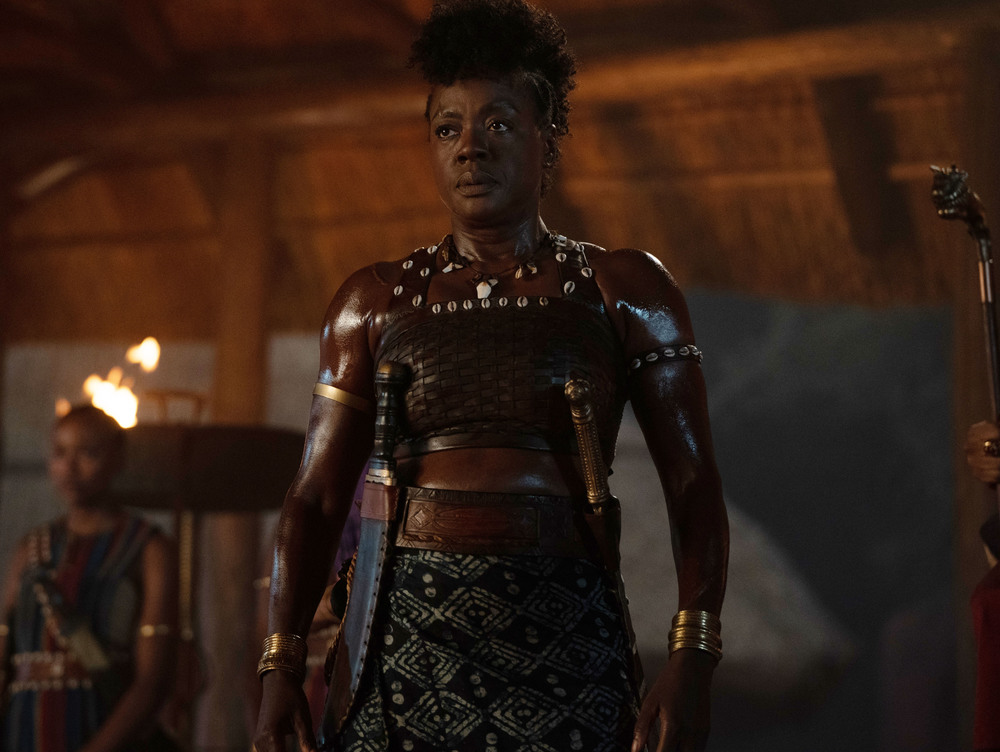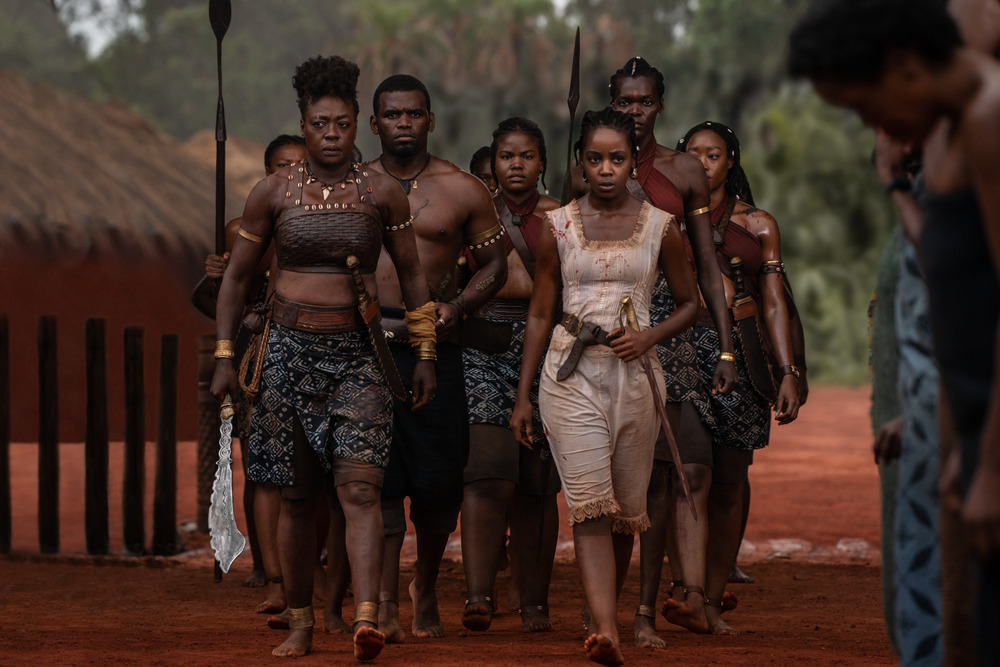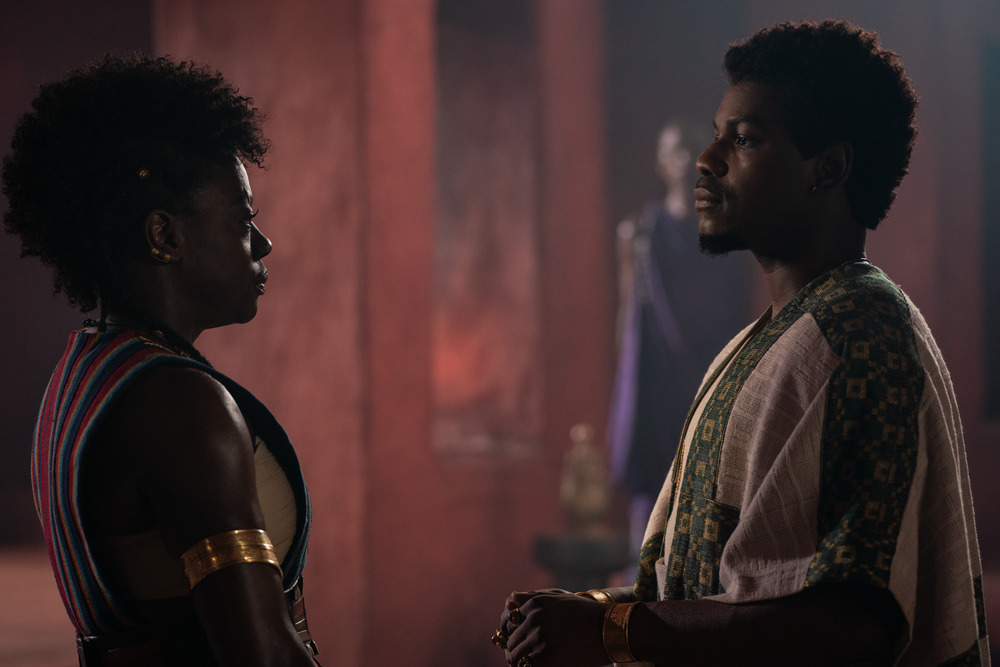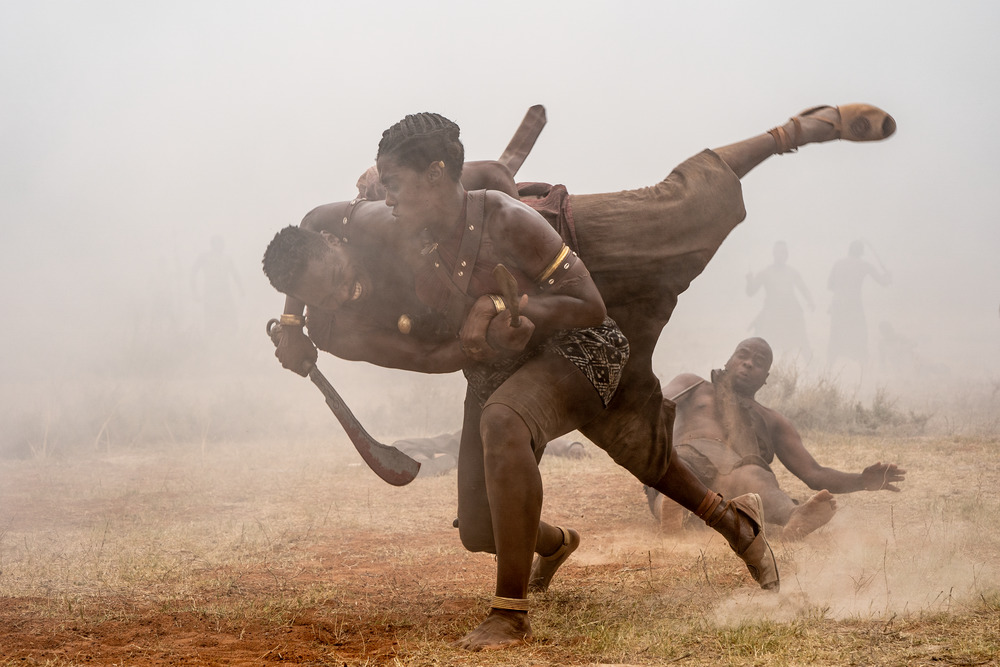Oscar®-winner Viola Davis leads “The Woman King,” co-starring John Boyega, Thuso Mbedu, Lashana Lynch, and Sheila Atim. Our J.P. reviews the historical epic film.
The Woman King
Sony Pictures
- Directed by: Gina Prince-Bythewood
- Screenplay by: Dana Stevens
- Story by: Maria Bello, Dana Stevens
- Produced by: Cathay Schulman, viola Davis, Julius Tennon, Maria Bello
- Starring: Viola Davis, Thuso Mbedu, Lashana Lynch, Sheila Atim, John Boyega
- Cinematography: Polly Morgan
- Edited by: Terilyn A. Shropshire
- Music by: Terence Blanchard
Studio Synopsis:
The Woman King is the remarkable story of the Agojie, the all-female unit of warriors who protected the African Kingdom of Dahomey in the 1800s with skills and a fierceness unlike anything the world has ever seen. Inspired by true events, The Woman King follows the emotionally epic journey of General Nanisca (Oscar®-winner Viola Davis) as she trains the next generation of recruits and readies them for battle against an enemy determined to destroy their way of life. Some things are worth fighting for…

J.P.’s Take:
Director Gina Prince-Bythewood is upping her game in the action arena after receiving praise for directing the Netflix smash, “The Old Guard.” However, this is no run-of-mill action film.
“The Woman King” is an ambitious portrayal of historical events and real figures that are both uplifting and unflinchingly graphic.
This is evident in the opening sequence, where a battalion of female warriors, led by General Nanisca (Viola Davis), advance upon a village of men who have kept their women captive. Watching these fierce women rise from the tall grass is chilling as they belt out a battle cry. Then, they proceed to shred through their opponents like deli meat. These warriors are a force to be reckoned with, as they make deadly use of their razor-sharp hand-to-hand combat skills, weapons tactics, and cat-like reflexes.

When presenting such an epic tale about actual people and events, there is a tricky dance to maintain in balancing facts and fantasy. As you become engrossed in the breadth of material packed into 2-hours, you realize writers Dana Stevens and Maria Bello, who conceived the idea in 2015 after visiting Benin and learning the history of the Agojie, have done their homework.
This is the true tale of the Agojie, an all-female military regiment, who were heroines in their own right. Considered to be some of the most ferocious warriors in West Africa, they served to protect the Dahomey Kingdom from the 16th to the 19th centuries. Their devotion to their homeland meant taking a vow of celibacy and remaining childless throughout their call of duty.
The scope of the story is indeed monumental, while touching on the West African slave trade and the side dealings between the Dahomey Kingdom and the Portuguese colonizers.

The focus then shifts toward the raging battle between the Oyo Empire and the Agojie, whose sworn enemy is the traitorous General Oba Ade (Jimmy Odukoya) of the Oyo’s army. What sets off this war has to do with General Ade being the facilitator of selling his own people to Portuguese settlers. Caught in the middle of this dilemma is King Ghezo (John Boyega) of the Dahomey Kingdom, who has to appease both the Portuguese slave traders and General Ade to keep the peace. These atrocities send the Agojie on a warpath to end the Oyo’s reign of terror for good. Every plot piece is woven together seamlessly, allowing the audience to follow along without too many detours.
In a side story, a young woman named Nawi (Thuso Mbedu), who is considered unfit for marriage, is delivered to King Ghezo by her father as payment for his debt. General Nanisca is charged with Nawi’s welfare, while she trains under the tutelage of Nanisca’s Sergent Izogie (Lashana Lynch). Through trial and tribulation, Nanisca and Izogie discover Nawi has the heart of a true warrior and continue bringing her up in their ways. Moments spent with the three, provided some rousing, touching, and comical antics together.

Director Prince-Bythewood is quite capable of balancing the scale here, keeping the focus of the narrative arrow straight and concise. She’s also competent and efficient at unleashing some of the most impressive battle montages around. Fortunately, the action never overpowers the emotional ties of the story’s thread. The grand set pieces and beautifully adorned costuming were constructed with loving attention to detail, and I felt immersed in the village of West Africa.
I’d be hard-pressed to choose just one actor/actress as the breakout star here. Although Viola Davis anchored the story in general, the cast as a whole were set up for success in bringing this film to life.
“The Woman King” was not only a striking tale of female empowerment; its also had a heart of gold at its core. At the end of the film, I heard nothing but the roar of applause and cheers. I was proud to join them.
